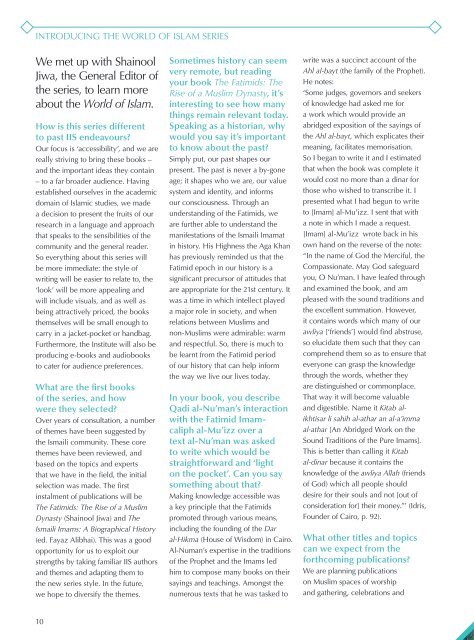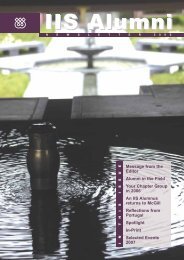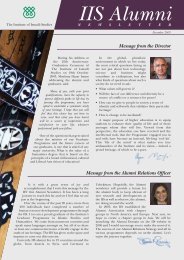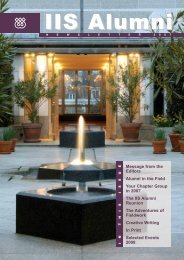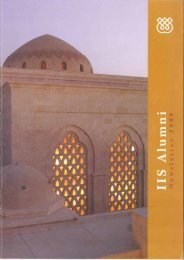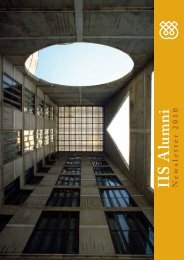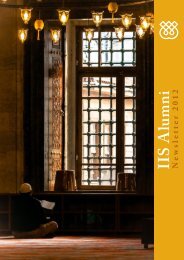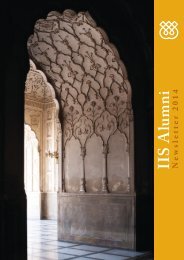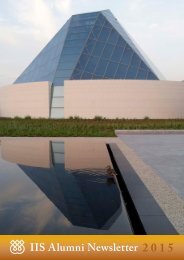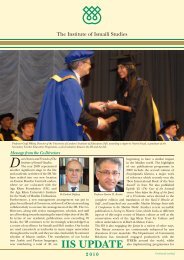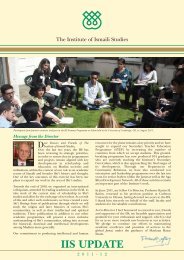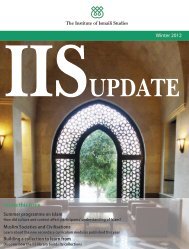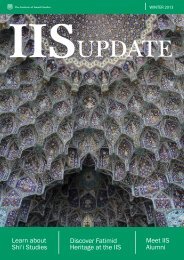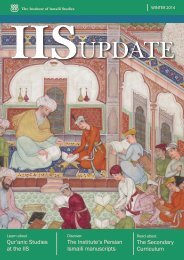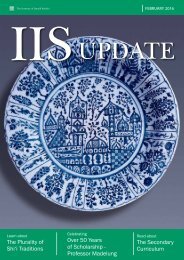IIS Update - Edition 17
IIS Update - Edition 17 The Institute has been publishing an annual IIS Update since 2000, to inform its supporters, affiliates and well-wishers of its programmes and activities. The IIS Update includes information about the Institute’s recent and forthcoming projects, as well as news about its publications and staff.
IIS Update - Edition 17
The Institute has been publishing an annual IIS Update since 2000, to inform its supporters, affiliates and well-wishers of its programmes and activities. The IIS Update includes information about the Institute’s recent and forthcoming projects, as well as news about its publications and staff.
Create successful ePaper yourself
Turn your PDF publications into a flip-book with our unique Google optimized e-Paper software.
INTRODUCING THE WORLD OF ISLAM SERIES<br />
We met up with Shainool<br />
Jiwa, the General Editor of<br />
the series, to learn more<br />
about the World of Islam.<br />
How is this series different<br />
to past <strong>IIS</strong> endeavours?<br />
Our focus is ‘accessibility’, and we are<br />
really striving to bring these books –<br />
and the important ideas they contain<br />
– to a far broader audience. Having<br />
established ourselves in the academic<br />
domain of Islamic studies, we made<br />
a decision to present the fruits of our<br />
research in a language and approach<br />
that speaks to the sensibilities of the<br />
community and the general reader.<br />
So everything about this series will<br />
be more immediate: the style of<br />
writing will be easier to relate to, the<br />
‘look’ will be more appealing and<br />
will include visuals, and as well as<br />
being attractively priced, the books<br />
themselves will be small enough to<br />
carry in a jacket-pocket or handbag.<br />
Furthermore, the Institute will also be<br />
producing e-books and audiobooks<br />
to cater for audience preferences.<br />
What are the first books<br />
of the series, and how<br />
were they selected?<br />
Over years of consultation, a number<br />
of themes have been suggested by<br />
the Ismaili community. These core<br />
themes have been reviewed, and<br />
based on the topics and experts<br />
that we have in the field, the initial<br />
selection was made. The first<br />
instalment of publications will be<br />
The Fatimids: The Rise of a Muslim<br />
Dynasty (Shainool Jiwa) and The<br />
Ismaili Imams: A Biographical History<br />
(ed. Fayaz Alibhai). This was a good<br />
opportunity for us to exploit our<br />
strengths by taking familiar <strong>IIS</strong> authors<br />
and themes and adapting them to<br />
the new series style. In the future,<br />
we hope to diversify the themes.<br />
Sometimes history can seem<br />
very remote, but reading<br />
your book The Fatimids: The<br />
Rise of a Muslim Dynasty, it’s<br />
interesting to see how many<br />
things remain relevant today.<br />
Speaking as a historian, why<br />
would you say it’s important<br />
to know about the past?<br />
Simply put, our past shapes our<br />
present. The past is never a by-gone<br />
age; it shapes who we are, our value<br />
system and identity, and informs<br />
our consciousness. Through an<br />
understanding of the Fatimids, we<br />
are further able to understand the<br />
manifestations of the Ismaili Imamat<br />
in history. His Highness the Aga Khan<br />
has previously reminded us that the<br />
Fatimid epoch in our history is a<br />
significant precursor of attitudes that<br />
are appropriate for the 21st century. It<br />
was a time in which intellect played<br />
a major role in society, and when<br />
relations between Muslims and<br />
non-Muslims were admirable: warm<br />
and respectful. So, there is much to<br />
be learnt from the Fatimid period<br />
of our history that can help inform<br />
the way we live our lives today.<br />
In your book, you describe<br />
Qadi al-Nu’man’s interaction<br />
with the Fatimid Imamcaliph<br />
al-Mu’izz over a<br />
text al-Nu’man was asked<br />
to write which would be<br />
straightforward and ‘light<br />
on the pocket’. Can you say<br />
something about that?<br />
Making knowledge accessible was<br />
a key principle that the Fatimids<br />
promoted through various means,<br />
including the founding of the Dar<br />
al-Hikma (House of Wisdom) in Cairo.<br />
Al-Numan’s expertise in the traditions<br />
of the Prophet and the Imams led<br />
him to compose many books on their<br />
sayings and teachings. Amongst the<br />
numerous texts that he was tasked to<br />
write was a succinct account of the<br />
Ahl al-bayt (the family of the Prophet).<br />
He notes:<br />
‘Some judges, governors and seekers<br />
of knowledge had asked me for<br />
a work which would provide an<br />
abridged exposition of the sayings of<br />
the Ahl al-bayt, which explicates their<br />
meaning, facilitates memorisation.<br />
So I began to write it and I estimated<br />
that when the book was complete it<br />
would cost no more than a dinar for<br />
those who wished to transcribe it. I<br />
presented what I had begun to write<br />
to [Imam] al-Mu’izz. I sent that with<br />
a note in which I made a request.<br />
[Imam] al-Mu’izz wrote back in his<br />
own hand on the reverse of the note:<br />
“In the name of God the Merciful, the<br />
Compassionate. May God safeguard<br />
you, O Nu’man. I have leafed through<br />
and examined the book, and am<br />
pleased with the sound traditions and<br />
the excellent summation. However,<br />
it contains words which many of our<br />
awliya [‘friends’] would find abstruse,<br />
so elucidate them such that they can<br />
comprehend them so as to ensure that<br />
everyone can grasp the knowledge<br />
through the words, whether they<br />
are distinguished or commonplace.<br />
That way it will become valuable<br />
and digestible. Name it Kitab alikhtisar<br />
li sahih al-athar an al-a’imma<br />
al-athar [An Abridged Work on the<br />
Sound Traditions of the Pure Imams].<br />
This is better than calling it Kitab<br />
al-dinar because it contains the<br />
knowledge of the awliya Allah (friends<br />
of God) which all people should<br />
desire for their souls and not [out of<br />
consideration for] their money.”’ (Idris,<br />
Founder of Cairo, p. 92).<br />
What other titles and topics<br />
can we expect from the<br />
forthcoming publications?<br />
We are planning publications<br />
on Muslim spaces of worship<br />
and gathering, celebrations and<br />
10


